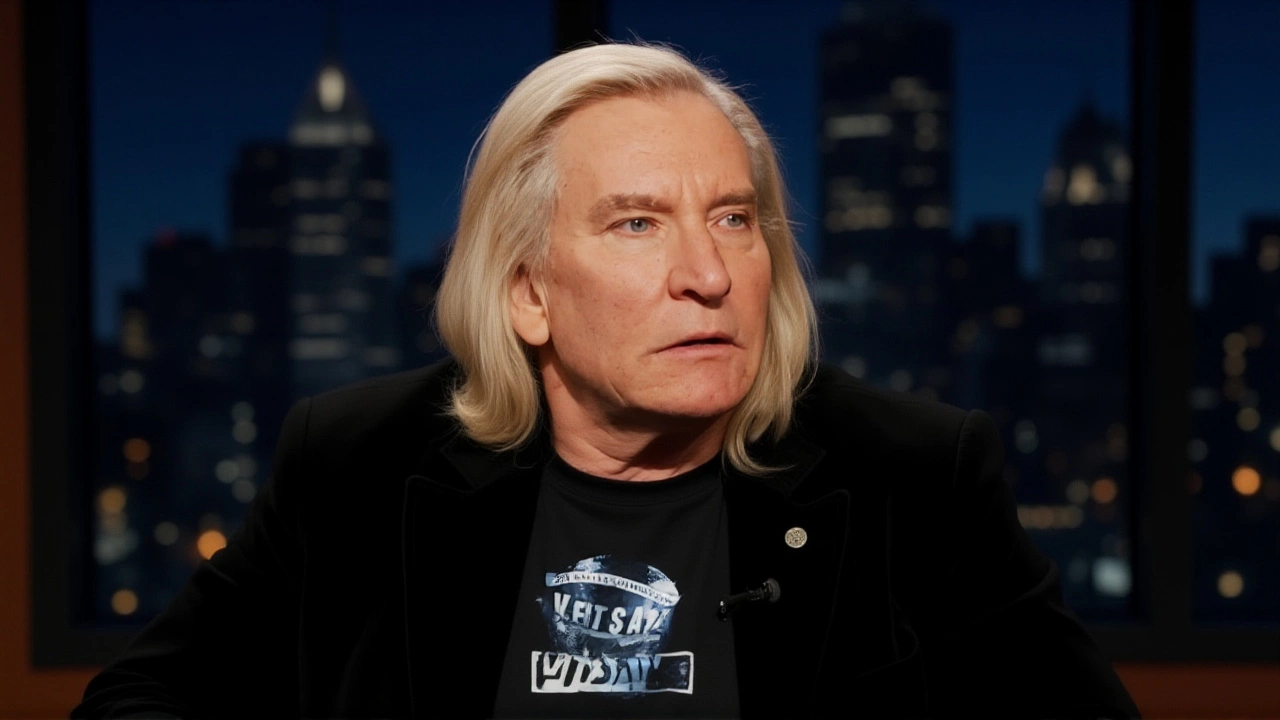
Joe Walsh didn’t just write a song—he packed a lifetime of thoughts into one. On March 6, 2025, at 22:00 UK time, Far Out Magazine published an intimate look at a track the legendary guitarist called "overwhelming" to listen to—once. Not because it was bad. But because it was everything. In a piece by journalist Tim Coffman (@timmusic13), Walsh revealed he’d taken ten full pages of random ideas—things he’d scribbled during downtime, fragments of conversations, half-formed metaphors—and crammed them all into a single song. "I thought I should write this song about all the things there are," Walsh said. "Did you ever stop and think of how many things there are? So that turned into a song, and it’s a little overwhelming to hear the first time, but if you listen to it three or four times, I think I covered most of the things there are."
How a Song Became a Creative Escape Hatch
Walsh, known for his work with the Eagles and his solo hits like "Life’s Been Good," isn’t the type to sweat over writer’s block. "I didn’t have those kinds of internal struggles most of the time," he told Coffman. But when it hit, it hit hard. And when it did, he didn’t stare at the blank page. He filled it. All of it. Every stray thought. Every half-remembered dream. Every odd observation from a roadside diner. Then he turned it into music. The result? A track where lyrics shift like quicksand—suddenly from a meditation on grocery store lighting to a line about a dog chasing a mailman, then a philosophical jab at time itself. "Some of the lines feel like they could have been taken from separate song ideas every time he gets to a new section," Coffman notes. It’s not sloppy. It’s intentional. Walsh wanted it to feel "in-your-face," like someone shouting a hundred topics at you in a crowded room. And that’s exactly what it does.The Unspoken Elephant in the Room
Here’s the twist: this wasn’t just about beating writer’s block. It was about dodging a much bigger one. The article doesn’t name the band. But anyone who’s followed Walsh’s career knows what’s being hinted at. The Eagles’ final chapter was messy. Fractured relationships. Legal battles. Silence from everyone involved. When Walsh went solo after, the public wondered—what did he really think? How did he feel? Did he blame them? Did they blame him? Walsh never answered directly. Instead, he wrote this song. "As goofy a concept as it sounds, though, this was the best way that Walsh could have dodged the massive elephant in the room," Coffman writes. "Everyone was going to be wondering what he had to say about the way the band ended, so him writing about this kind of subject was a great way of him saying everything while also keeping his mouth shut." It was genius. By burying his feelings under a avalanche of random observations, he avoided confrontation. He didn’t deny the pain. He just didn’t give it a name. And in doing so, he preserved the image fans loved: the lovable goofball who’d rather crack a joke than spill a secret.
Why This Matters Beyond One Song
Most artists use albums to process grief, anger, or heartbreak. Walsh used a song to avoid it. And somehow, that made it more honest. Think about it: we live in an age of oversharing. Artists post their therapy sessions on Instagram. They release EPs titled "My Breakup With Myself." But Walsh? He gave us a chaotic, beautiful mess—and let us decide what it meant. No press tour. No tearful interview. Just a track that demands multiple listens, not because it’s cryptic, but because it’s full. It’s a reminder that sometimes, the most powerful thing an artist can say is nothing at all. Or rather, everything.
The Legacy of a Rambling Masterpiece
There’s no official title. No release date. No album name. No chart stats. Joe Walsh hasn’t performed it live. Far Out Magazine didn’t get a studio session. All we have is his quote, Coffman’s interpretation, and the lingering sense that somewhere, in a dusty studio in California, there’s a tape of a man laughing as he layers 47 different ideas into one song. And maybe that’s the point. The song isn’t meant to be perfect. It’s meant to be human. "There’s a lot of rambling that he goes through in this tune," Coffman observes, "but it’s all in service to him being the lovable goofball most people always knew." In a world obsessed with clarity, Walsh gave us chaos—and it felt like truth.Frequently Asked Questions
What song is Joe Walsh talking about?
The song has no official title, release date, or album affiliation. It remains unreleased as of March 2025, known only through Joe Walsh’s description to Far Out Magazine. Fans speculate it may be an unreleased demo from his post-Eagles era, but no studio recordings or track listings have been confirmed.
Why didn’t Joe Walsh name the band?
While the article doesn’t name the band, context strongly points to the Eagles. Walsh left the group in 2023 after years of tension, and the timing aligns with his solo work. By avoiding direct reference, he preserved his public persona as a humorous, non-confrontational figure—turning grief into art without drama.
Is this song available to listen to?
No, the track has not been officially released or leaked. Far Out Magazine’s article is based solely on Walsh’s verbal account. No audio samples, studio logs, or fan recordings have surfaced. It exists only as a concept—a creative experiment that may never be heard publicly.
How does this compare to other artists’ approaches to writer’s block?
Most artists use structured methods: journaling, collaboration, or thematic albums. Walsh’s approach was radical—instead of narrowing focus, he expanded it wildly. Similar to how Bob Dylan’s "Like a Rolling Stone" broke rules, Walsh broke the rule of thematic cohesion, using density as emotional camouflage rather than artistic failure.
What does this say about Joe Walsh’s personality?
It reinforces his long-standing image as the rock ‘n’ roll trickster. He’s never been the type to give serious interviews or dwell on drama. By turning a painful chapter into a funny, chaotic song, he maintained control—without saying a word. It’s not evasion. It’s artistry with a wink.
Could this song ever be released?
Possibly. Walsh has a history of revisiting old demos—his 2022 album "Analog Man" included unreleased tracks from the 1980s. If he ever feels ready to revisit the emotional weight behind the song, a future archival release could surface. Until then, it remains a legend whispered among fans and journalists alike.
 Entertainment
Entertainment